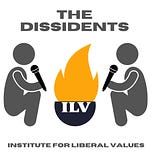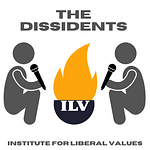In this episode of The Dissident Podcast, James & Chris explore some of the legal, political, and moral arguments that undercut the basis for the modern welfare-regulatory state - which sees coercive powers concentrated in a central government body that intervenes into most human affairs, often in illiberal ways that pit one interest group against another or prioritize the interests of those in power. They show why it can only ever be that way under the current paradigm, regardless of who is in charge. With a particular focus on welfare & IP regimes, they go on to discuss & debate some novel alternatives that could take the place of the current concentrated power structure while yielding safer & more productive outcomes for all citizens. Such liberal alternatives can also still solve many of the human challenges that the prevailing coercive systems seek to remedy.
Please consider donating to the Institute for Liberal Values, a 501c3 non-profit organization at ilvalues.org. All donations go to support our continued programming to realize our mission to provide the skills and support required to build community where there has been division, encourage free expression where there has been censorship, and foster optimism where there is fear.
*To sponsor a specific event with your name or logo, please reach out directly to admin@ilvalues.org*
Join the conversation in our May Liberalism in Practice Panel Discussion: Beyond Ideological Mandates in Social Work Education.
This panel discussion aims to critically examine the current state of social work education, exploring whether ideological mandates have undermined the profession's commitment to viewpoint diversity, academic freedom, and evidence-based practice. Drawing on perspectives from educators and practitioners, the session will address concerns about the adoption of critical theories that may narrow pedagogical approaches, inhibit intellectual exploration, and potentially compromise client-centered care. Panelists will discuss the tension between advancing social justice goals and maintaining professional integrity, while proposing frameworks that balance advocacy with respect for diverse worldviews, political perspectives, and clinical approaches in social work education to better prepare practitioners for effective service across varied communities.






Share this post